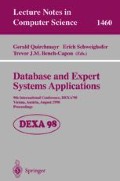Abstract
This paper describes an agent based architecture to manage workflows. The agents, rather than predefined rules, determine the flow of work, enabling them to cater for unexpected inputs. The agents in this distributed system use organisational rules, as well as the state of the decision making environment to control the flow of work. An experimental agent-based workflow system based on the World Wide Web to manage the processing of applications received by a university department from potential research students is described.
Preview
Unable to display preview. Download preview PDF.
References
Abbott, K.R. and Sarin, K.S. (1994): “Experiences with Workflow Management: Issues for the Next Generation” in Furuta, R., Neuwirth, C. (eds.): proceedings Conference on Computer Supported Cooperative Work, CSCW94, ACM Press, pp. 113–120.
Debenham, J.K. (1997) “Strategic Workflow Management”, in proceedings International Workshop Distributed Artificial Intelligence and Multi-Agent Systems DAIMAS'97, St Petersberg, June 1997, pp553–562.
Dellen, B., Maurer, F. and Pews G. (1997) “Knowledge Based Techniques to Increase the Flexibility of Workflow Management” in Data and Knowledge Engineering Journal (North Holland) 1997.
Finin, T., Fritzson, R., McKay, D. and McEntire, R. (1994) “KQML as an Agent Communication Language” in proceedings CIKM'94, pp447–455.
Georgakopolous, D. and Hornick, M. (1995) “An Overview of Workflow Management: From Process Modelling to Workflow Automation Infrastructure” in Distributed and Parallel Databases 3, pp 119–153.
Hawryszkiewycz, I.T. and Gorton, I. (1996): “Workflow Support for Change Management and Concurrency” Proceedings of the Conference on Software Engineering: Education and Practice, Dunedin, New Zealand, pp. 181–188.
Kwan, M.M. and Balasubramanian, P.R. (1997) “Dynamic Workflow Management: A Framework for Modelling Workflows” in proceedings Thirteenth Annual IEEE Hawaii International Conference on System Science.
Labrou, Y. and Finin, T. (1994) “A semantics approach for KQML — a general purpose communication language for software agents” in proceedings CIKM'94, pp456–464.
Nwana, H.S. and Azarmi, N. (1997) “Software Agents and Soft Computing, Towards Enhancing Machine Intelligence” (Springer-Verlag Berlin Heidelberg)
Suchman, L. (1987): “Plans and Situated Action: The Problem of Human-Machine Communication” Cambridge University Press, Cambridge.
Author information
Authors and Affiliations
Editor information
Rights and permissions
Copyright information
© 1998 Springer-Verlag Berlin Heidelberg
About this paper
Cite this paper
Hawryszkiewycz, I., Debenham, J. (1998). A workflow system based on agents. In: Quirchmayr, G., Schweighofer, E., Bench-Capon, T.J. (eds) Database and Expert Systems Applications. DEXA 1998. Lecture Notes in Computer Science, vol 1460. Springer, Berlin, Heidelberg. https://doi.org/10.1007/BFb0054475
Download citation
DOI: https://doi.org/10.1007/BFb0054475
Published:
Publisher Name: Springer, Berlin, Heidelberg
Print ISBN: 978-3-540-64950-2
Online ISBN: 978-3-540-68060-4
eBook Packages: Springer Book Archive

